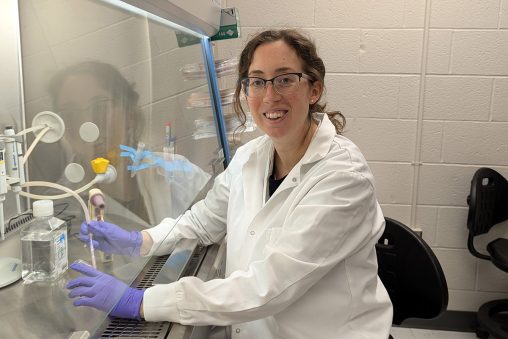
Alex Carpenter, a postdoctoral researcher in Wright State’s Department of Pharmacology and Toxicology, received a prestigious grant from the National Institute of Environmental Health Science that helps postdoctoral researchers transition to research faculty.
The Department of Pharmacology and Toxicology in Wright State University’s Boonshoft School of Medicine received a major training award from the National Institutes of Health, the first of its kind for the university.
Alex Carpenter, Ph.D., a postdoctoral researcher in the Department of Pharmacology and Toxicology, will serve as principal investigator of the grant, which enables postdoctoral researchers to transition to research faculty.
Carpenter’s work is supported by a five-year, $1 million National Institute of Environmental Health Science K99/R00 funding grant.
“In a way, this grant funding was the culmination of my entire time as a postdoctoral researcher,” Carpenter said. “We first submitted this proposal in February 2022. When we started getting notifications that made it look like it might get funded, it was very surreal. With this money, I will get to run clinical studies. It will also act as seed money to help me get started as a research faculty.”
The grant allocates $100,000 for each of the two years Carpenter performs research at Wright State and approximately $250,000 a year for three subsequent years as a junior research faculty.
“One of the main things that I am excited about is that this grant is funding some exciting observational human subjects studies regarding photosensitive autoimmune disorders that otherwise I would not have had funds to study,” she said.
She will also shadow physicians, including Jeffrey Travers, M.D., Ph.D., professor and chair of pharmacology and toxicology and professor of dermatology, and learn how to lead independent clinical trials.
“The grant is also funding some work that should help me start my own independent research lab,” Carpenter said.
A Virginia native, Carpenter earned her bachelor’s degree in chemistry from the University of Mary Washington and her Ph.D. in chemistry from Carnegie Mellon University. She also earned a certification in clinical trials coordination from Wright State.
Carpenter began working in 2020 in the lab of Mike Kemp, Ph.D., associate professor of pharmacology and toxicology at Wright State, where she studied DNA damage response processes that occur after ultraviolet (UV) exposure and cell-free damaged DNA.
“I was pleasantly surprised to find a solid core of researchers and facilities here at Wright State,” she said. “The faculty in pharmacology and toxicology have been very engaged with research and mentorship. I have gotten the opportunity to perform lots of types of research I never envisioned performing with my chemistry background.”
After Carpenter joined his lab, Kemp asked her to investigate whether damaged DNA could be found in extracellular or cell-free DNA that might be released from cells following exposure to UV radiation.
Through great initiative, creativity and independence, Kemp said Carpenter showed “UV photoproducts could be found in cfDNA likely in association with extracellular vesicles (EVs) that this damaged DNA is released from cells as they undergo cell death. Alex’s recent NIH K99 grant proposes that this damaged EV-associated cfDNA likely contributes to the etiology of photosensitive autoimmune disorders such as lupus.”
Carpenter is also masterful as a trainer of post-graduate-level students seeking to enter the research arena, Kemp said.
“Our department has a large and successful master’s degree program, and Alex has been key to the success of the students who carry out their master’s thesis research in my lab each year, all of whom have gone on to jobs in industry or academia or entered Ph.D. programs,” he said. “Alex works incredibly well with these students, who all know that they can go to her for technical and career advice. Alex is patient with them as they are learning new techniques and always provides valuable feedback and suggestions. These skills will bode well for Alex as she develops her own independent laboratory in the next couple of years at whatever university is lucky to recruit her.”
Carpenter credited the collaborative nature of the Department of Pharmacology and Toxicology for fostering the performance of translational research.

 Wright State faculty member Damaris Serrano wins Panamanian literary award
Wright State faculty member Damaris Serrano wins Panamanian literary award  Wright State grad Hannah Beachler earns Oscar nomination for production design on ‘Sinners’
Wright State grad Hannah Beachler earns Oscar nomination for production design on ‘Sinners’  Wright State alum Emily Romigh builds on a family legacy in education
Wright State alum Emily Romigh builds on a family legacy in education  Wright State receives $3 million grant to strengthen civic literacy and engagement across Southwest Ohio
Wright State receives $3 million grant to strengthen civic literacy and engagement across Southwest Ohio  Fitness Center renovation brings new equipment and excitement to Wright State’s Campus Recreation
Fitness Center renovation brings new equipment and excitement to Wright State’s Campus Recreation 